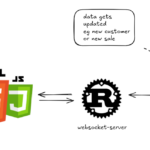Web Scraping EBAY with ScrapeOps & Rust
In this article I show some code to web scrape EBAY using Rust and a proxy provided by ScrapeOps The code below uses the ScrapeOps endpoint : “https://proxy.scrapeops.io/v1/” and the requests are forwarded on to your chosen url to scrape. How to get an API key? You can get a free one, with 1000 tokens […]












